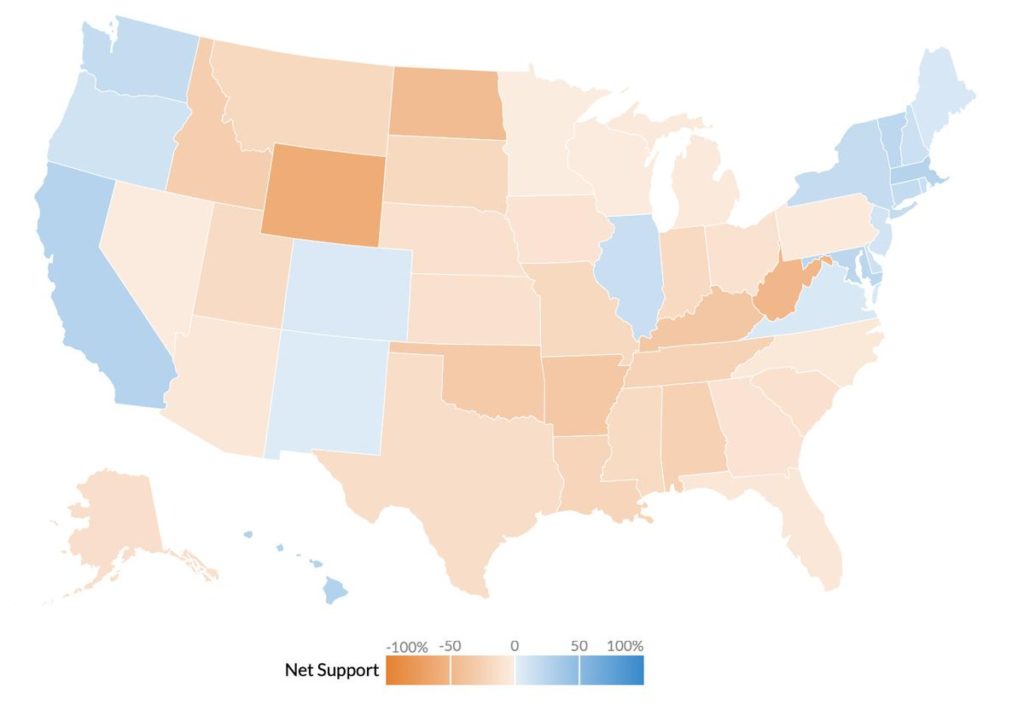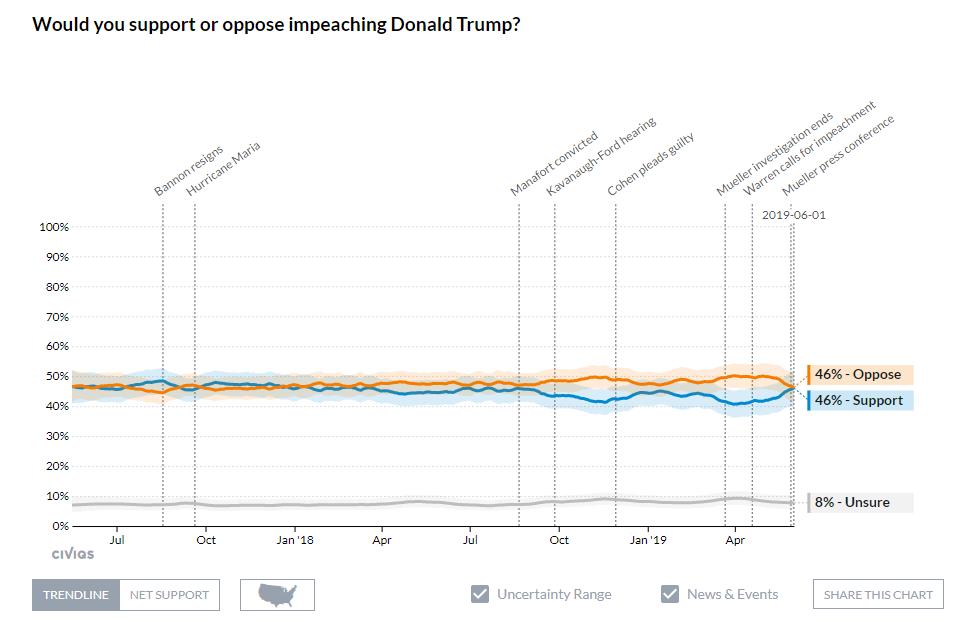Democrats are increasingly in support of impeaching President Donald Trumpand removing him from office but the majority of Americans remain opposed to the prospect, a new CNN Poll conducted by SSRS shows.
Trump’s approval rating, meanwhile, holds exactly even with where it was in late April — 43% approve and 52% disapprove of the President, according to the poll. That’s the case even as support for impeachment rose slightly from 37% last month to 41% now.
Similarly, those backing impeachment hit 43% in December, down from CNN’s previous high mark of this question with 47% in September 2018. The new poll finds 54% are against impeachment.The shift on impeachment stems mostly from a rebound in support for it among Democrats — 76% favor it currently, up from 69% in April. Whites who hold college degrees have also increased their support for impeachment. In surveys in April and March, fewer than 3 in 10 in that group favored proceedings, but that number has now climbed to 41%.
CNN’s poll has trump’s approval a little bit higher than most of the others. (538’s average has him at 41.5) But the movement on impeachment is significant. And it’s not because the facts have changed. Its because more and more Democratic leaders are standing up. Leadership matters.
Also, the Democratic party should probably pay a little bit more attention to their own base on this. 76% of Democrats favor impeachment! And a whole bunch of college-educated white people, many of whom used to vote Republican, are also on board. This is not a static opinion.
I don’t know if the leadership has some grand plan to wait for support to rise before they impeach. But Pelosi insists that she wants to know in advance that the Senate would convict, which means she doesn’t care if 100% of Democrats and Independents back impeachment, Republicans must be there too. Maybe she’ll change her mind. I hope so.
Perhaps this map, from a Civiqs poll, shows the concern:

The Civiqs poll has a 46/46 approve/disapprove on impeachment, which is actually a tick up for them:

So now let’s look at what happened with Nixon in that regard. Gallup provides with this breakdown of four of its national polls on impeachment (the question wording shifts midway through):

As you can see, among Republicans, support for impeachment or removal moved from 6 percent in June of 1973, to 31 percent in August 1974.
Among independents, those numbers moved from 18 percent to 55 percent. And among Democrats, they moved from 27 percent to 71 percent.
In some ways, this offers more grist for believing that public opinion can be shifted again. Note that the shift was more substantial among independents, eventually amounting to a solid majority, than it was among Republicans.
Right now, independents are a key reason public support for impeachment is low. A recent Post-ABC News poll, which found that only 37 percent of Americans support beginning impeachment proceedings while 56 percent oppose it, also found that among independents, those numbers are 36 percent to 59 percent.
The Gallup numbers on Nixon suggest that big shifts among independents are possible and show that a substantially larger percentage of independents now support impeachment hearings than at the outset in Nixon’s day.
In other words, it might be possible to build majority support for an impeachment inquiry on Trump, even if Republican voters don’t ever move much on this question.
Princeton historian Julian Zelizer, the co-author of a new book on U.S. history, points out that the jumps in support for impeaching Nixon came after high-profile events.
For instance, Zelizer noted, the jump in July 1974 didn’t come until after the House Judiciary Committee launched impeachment hearings in May 1974, and the subsequent jump in August 1974 came after the Committee approved articles of impeachment in July of that year.
“It’s clear from the data that impeachment proceedings provided the jolt that shook the public, among independents in particular,” Zelizer told me. “An independent by nature is not going to make a quick decision. Impeachment proceedings and then the approval of articles of impeachment are what ended up moving independents.”
“This wasn’t Congress waiting on the public,” Zelizer added. “It was the other way around — Congress provided guidance to the public.”
Democratic leaders insist an impeachment inquiry must have bipartisan support, meaning Republicans must come around. If that doesn’t happen, goes this argument, the Senate will acquit, so an impeachment inquiry will rip the country apart and potentially alienate swing voters while resulting in no serious consequences for Trump.
But if anything, this new data casts doubt on that approach. It raises the possibility that public opinion can be shifted in the middle regardless of whether Republicans ever support an inquiry in large percentages. What’s more, note that Republican support for impeaching Nixon never even reached one-third even at the end of the process.
And given current realities — deep partisan polarization, and the massive media propaganda apparatus Trump enjoys that Nixon never had — it’s plausible that Republicans could never come around in even those numbers. “Republican voters might be much less movable than in 1974,” Zelizer noted.
But take a look. Here’s Gallup’s data on Nixon’s approval over the same period:

Try to imagine Trump’s approval among Republicans falling to 50 percent, and you get the idea.
It’s possible that because of this polarization, Republican-leaning independents might also be less movable, but we cannot know this in advance. And it’s also true that in Nixon’s day, there was far more time in advance of the next election to build support, but that perhaps argues for more prompt action now.
The bottom line is that insisting that even an impeachment inquiry can’t happen until Republicans support one might be tantamount to giving Republican intransigence — and Trump’s disinformation network — total veto power over whether our political system ever even considers the question of whether Trump’s corruption and misconduct amount to the high crimes and misdemeanors that merit removal.
That is likely tantamount to saying it can never happen at all. If that’s the real point, Democratic leaders should say so.
In fairness, Democratic leaders argue that pushing forward with oversight outside impeachment will shed light on Trump’s misdeeds, and that if this builds support for an inquiry, it might then be appropriate.
Look: If Democrats score multiple oversight wins in court, and new light is being shed on Trump’s corruption, it would be somewhat understandable if they then refrained from an inquiry, though the case for one has already been strong for many months.
But as many legal experts have pointed out, an inquiry would strengthen Democrats’ hands in these very same oversight battles, making success more likely. And if Democrats lose a bunch of them, and we find ourselves in the fall, and Democrats don’t want to launch one due to the looming election, then what?
If you oppose an inquiry, but also want Trump held accountable, you should at least engage with the risks embedded in this scenario — and with the fact that the current conduct of Democrats could dramatically influence public opinion on the impeachment question. It’s not enough to simply declare that opinion tilts against an inquiry. Democrats don’t lack agency here.
